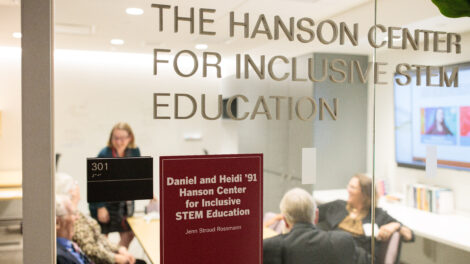Championing an inclusive campus culture

Advancing Equity and Inclusion in STEM
Profs. Jenn Rossmann and Mary Armstrong co-author award-winning paper that shows WGSS coursework can benefit underrepresented engineering students
A core element of the Hanson Center’s mission is to foster collaboration and community among faculty with interests in inclusive STEM Studies–an interdisciplinary field in which the theories, perspectives, and methods of inquiry from the social sciences, humanities, and other disciplines are used to study the cultures, practices, methods, and products of STEM. We support a community of scholars who are committed to advancing inclusive STEM Studies. Below we provide some examples of the research being conducted in inclusive STEM Studies at Lafayette.
Professor Mary Armstrong, Charles A. Dana Professor of women’s, gender and sexuality studies and English, and Professor Jenn Stroud Rossmann, Mathew Baird Professor of mechanical engineering, have conducted award-winning research about the positive impact of taking courses in women’s, gender, and sexuality studies (WGS) on the the sense of belonging in engineering by historically minoritized students. They found that having enrolled in a WGS course increased engineering students’ awareness of systemic biases and processes, and enhanced their confidence and agency. Further, it empowered engineering students to support peers experiencing marginalization.

Profs. Jenn Rossmann and Mary Armstrong co-author award-winning paper that shows WGSS coursework can benefit underrepresented engineering students
Research being conducted by the Hanson Center in partnership with the Engineering Division is interested in better understanding the factors that influence academic performance and retention in engineering for majority and historically-minoritized students. This study is examining growth mindset, self-efficacy, and engineering identity on spatial visualization skills–the ability to mentally manipulate 2-dimensional and 3-dimensional figures– and on retention in engineering.
The Hanson Center is available to meet with departments, programs, and student groups to present data-informed practices shown to advance inclusive excellence in STEM. Some examples of programs about which the Hanson Center has presented include growth mindset, active learning, being an upstander, imposter phenomenon, and social identities and leadership journeys. If you are interested in discussing these practices–and others–or if you would like to partner with the Hanson Center on a program, please contact us.